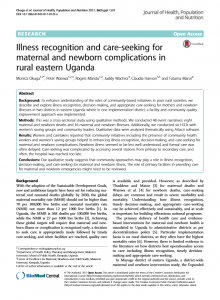
To enhance understanding of the roles of community-based initiatives in poor rural societies, we describe and explore illness recognition, decision-making, and appropriate care-seeking for mothers and newborn illnesses in two districts in eastern Uganda where in one implementation district, a facility and community quality improvement approach was implemented.
This was a cross-sectional study using qualitative methods. We conducted 48 event narratives: eight maternal and newborn deaths and 16 maternal and newborn illnesses. Additionally, we conducted six FGDs with women’s saving groups and community leaders. Qualitative data were analyzed thematically using Atlas.ti software.
Our qualitative study suggests that community approaches may play a role in illness recognition, decision-making, and care-seeking for maternal and newborn illness. The role of primary facilities in providing care for maternal and newborn emergencies might need to be reviewed.